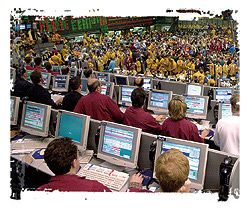Trading Tips
Today is which is a good date to start trading using an improved trading system for a better possibility of profitable successful trading on the futures exchange. There is no doubt that trading requires more than a few quick tips for success. You need experience, capital and, most importantly, a solid futures trading system. However, for the average beginner and those who perhaps are losing their focus because of significant drawdown, keeping things as simple as possible can help bring needed focus into your trading. Here are some trading tips you can use to help you make a success at trading:
1. Never add money when you are losing.
2. Always determine a stop and a profit objective before you start entering a trade. Place stops that are based on market information, and not your account balance.
3. Remember the power of a position. You should never make a market judgment when you have a position.
4. In a Bull market, you never want to sell a dull market, in Bear market, you should certainly never buy a dull market.
5.  There are times, due to a lack of liquidity, or excessive volatility, when you should not trade at all.
There are times, due to a lack of liquidity, or excessive volatility, when you should not trade at all.
6. Trading systems that work in an up market may not work in a down market.
7. There are at least three types of markets like up-trending, trading range, and down-trending, and it may be best if you have a different trading strategy for each market trend.
8. Up market and down market patterns are always there, and it is only that one is always more dominant. Select trades that move along with the trend.
9. A buy signal that fails is really just a sell signal. A sell signal that fails is a buy signal.
10. It's always easier to enter a losing trade.
11. During the blowout stage of any market, for example, the amazing
tulip bulb mania blowout market and incredible price collapse of long ago on the world's first organized commodity exchange, with powerful up or down moves, risk managers are busy issuing margin call liquidation orders. They don't check for overbought or oversold indictors; they just keep issuing margin calls. It's best to make sure you don't stand in the way.
12. Follow your instincts.
13. Buy the news that you hear, sell the fact based news.
14. News is only important when the market doesn't react in the direction of the news.
15. It helps for you to read today's paper tomorrow too. When you read yesterday's paper each day with the knowledge of what the market already did.
16. You should never enter a new trade in the direction of a gap. Never let the market make you make a trade.
17. The first and last tick are always the most expensive. Get in late and out early.
18. When everyone else is in, it's time for you to get out.
19. Never trade when you are not feeling well because it's negative to your thought process.
Forex Spreads - Getting to Know the Forex Spreads
A futures exchange is international and accepts commodity futures & forex trades from all over the world
Forex is always priced in pairs between two different types of currencies. When you make a trade, you have to buy one currency and sell another at the same time. If you want to exit the trade,  you must buy/sell the opposite position. If you want to exit the trade, you will have to sell Euros and buy back US Dollars.
you must buy/sell the opposite position. If you want to exit the trade, you will have to sell Euros and buy back US Dollars.
These days just about every forex broker is claiming to have the tightest spreads in the industry. But marketing does have the ability to be deceiving. The topic of spreads in the forex spot market is very complicated and often not easy to understand. However, nothing affects your trading profits or losses more.
First of all in order to understand the forex market spread, you need to know what it is. A spread is the difference between the ask price (the price you buy at) and the bid price (the price you sell at) that is quoted in the pips. If the quote between EUR/USD at a given moment is 1.2222/4, then the spread equals 2 pips. If the quote is 1.22225/40, then the spread is going to equal 1.5 pips.
The spread is how brokers make their money. Wider spreads will result in a higher asking price and a lower bid price. The consequence to this is that you have to pay more when you buy and get less when you sell, which makes it more difficult to realize a profit.
Spreads are important because they affect the return on your trading strategy in a big way. As a Forex 500 trader, your sole interest is buying low and selling high (like futures and commodities trading). Wider spreads means buying higher and having to sell lower. A half-pip lower spread doesn't necessarily sound like much, but it can easily mean the difference between a profitable trading strategy and one that isn’t profitable.
The tighter the spread is the better things are going to be for you. However tight spreads are only meaningful when they are paired up with good execution. Quality of trade execution will decide whether you actually receive tight spreads. A good example of this is when your screen shows a tight spread, but your trade is filled a few pips to your disadvantage or is mysteriously rejected.
Oddly enough, when it comes to economies of scale, forex doesn't even act like most other markets. On the inter-bank market, for example; the larger the ticket size, the larger the spread is. So when you see a 1-pip spread on an ECN trading network, you have to wonder if that spread is for a $2M, $5M or $10M trade, which it probably isn’t.
![]()
 NEW SOLUTIONS
NEW SOLUTIONS
Your Forex Strategy - Choosing Your Forex Strategy
Most of the successful traders in Forex will develop a trading strategy and work on perfecting the strategy over time. Some forex futures traders may focus on one particular technical study or calculation, while some others use broad spectrum analysis as a means of picking their trades. Most futures market experts are likely to suggest a trader uses a mixed combination of both fundamental and technical analysis, with which you can make long-term market projections and also determine entry and exit points. Of course, in the end, it's the individual futures trader who has to decide what works best for them self.
When you are ready to get started trading the FOREX Futures market, you should open a demo account and paper-trade with non-real money so you can practice trading until you can make consistent profits. Many forex futures traders who fail do so because they have a tendency to jump into the FOREX market and quickly lose a lot of money because they just don’t have the experience. It is important to take your time and learn to trade properly before you start committing any of your own capital.
You also need to be ale to trade without feeling. You can’t keep track of all stop-loss points if you don't have the ability to execute them at the right time. You must always set your stop-loss and take-profit points to execute automatically, and don't change them unless you absolutely have to. You have to make your decisions and stick to them. If you don’t you will drive yourself and your brokers crazy.
You should also realize you need to follow the trends. If you go against the trend, you are just messing around with your money because the FOREX market tends to trend more often than anything else and you will have a higher chance of success in FX trading by going with the trend. The FOREX market is the largest financial market in the world, and every day people are getting to be increasingly interested in it. But before you begin trading, make sure that your broker meets certain criteria, and take the time to find a trading strategy that works for you.
When it's time to choose your commodity futures broker, you will have to take your time as stated before and choose a broker who adheres to a particular formula. It just makes it easier for you to learn and begin your forex ventures.
Basic Forex Strategies
Technical analysis and fundamental analysis are the two basic areas of strategy to use when it comes to the FOREX market which is the exact same as in the equity markets. The difference however, is technical analysis of the markets is by far the most common day trading strategy routinely used by individual FOREX traders. Here is a brief overview of both forms of analysis and how they directly apply to forex trading:
Fundamental Analysis
If you think it's hard enough to value one company over another, you should try valuing a whole country instead. Fundamental analysis in the forex market is an extremely difficult one, and it's usually used only as a means to predict long-term trends. But it is important to mention that some traders do trade short term strictly on news releases. There are a lot of different indicators of the currency values that are released at many different times in the day. Here are a few of them to get you started:
Non-farm Payrolls
Purchasing Managers Index (PMI)
Consumer Price Index (CPI)
Retail Sales
Durable Goods
You need to know that these reports are not the only factors that you have to watch out for either. There are also quite a few different meetings where you can get some quotes and commentary that can affect markets just as much as any report. These meetings are often brought out to discuss any interest rates, inflation, and other issues that have the ability to affect currency values.
Even changes in how things are worded when they are addressing certain issues such as the Federal Reserve chairman's comments on interest rates; can cause the market to get very volatile. Two important meetings that you have to watch out for are the Federal Open Market Committee and Humphrey Hawkins Hearings.
Just by reading the reports and examining the commentary, it can help FOREX fundamental analysts to get a better understanding of any and all long-term market trends and also to allow short-term traders to be able to profit from important happenings. If you do decide to follow a fundamental strategy, you will want to be sure to keep an economic calendar around you at all times so you know when these reports are released. Your broker may also be able to provide you with real-time access to this kind of information via the internet.
Technical Analysis
Technical analysts of the Forex trading market analyze price trends. The only real difference between technical analysis in Forex trading and technical analysis in stock market trading is the general time frame that is involved in that FOREX markets are open 24 hours a day.
Because of this, some forms of technical analysis that factor in time have to be modified so that they can work directly with the 24 hour FOREX market. Some of the most common forms of technical analysis used in FOREX are:
The Elliott Waves
Fibonacci studies
Parabolic SAR
Pivot points
This is the point where you will actually choose your basic strategy. Basically it is best to simply choose whichever that you are the most comfortable with. Your broker can help you in making the right choice here.


